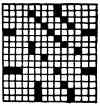 After carefully - and I want
to emphasize that word "carefully" selecting the problem and the
ten things between you and the solution, you then use the same
procedure as in solving a crossword puzzle. You take the easy
obstacles first and by a process of elimination you arrive at last at
the one or two major ones. In the solution of the remaining
obstacles you may need some simple apparatus, but the things
you will probably need most are infinite patience and persistence.
Few people realize the difficulties of doing any new thing.
After carefully - and I want
to emphasize that word "carefully" selecting the problem and the
ten things between you and the solution, you then use the same
procedure as in solving a crossword puzzle. You take the easy
obstacles first and by a process of elimination you arrive at last at
the one or two major ones. In the solution of the remaining
obstacles you may need some simple apparatus, but the things
you will probably need most are infinite patience and persistence.
Few people realize the difficulties of doing any new thing.Maybe one of the reasons people are so easily discouraged is because of their education. During all of our years at school we were examined two or three times a year. If we failed once we were out. In contrast, all Research work is 99.9 per cent failure and if you succeed once you are in. If we are going to progress in any line we must learn to fail intelligently so we won't become discouraged at the 99.9 per cent failure. As we approach the end of the War and make plans to go back to our normal ways of living we are going to be faced with unlimited problems. I am talking about Research, today, because it is just a method of intelligent planning. As you probably know, some four or five hundred postwar planning groups have been organized to take care of some of these problems for us. That is a step in the right direction, but I don't believe that is enough - we ought to have 135,000,000 planners. Each individual in this country should be doing his or her own planing - should be forming a one man or woman research project. We should not be looking outside for this help. We should be doing it for ourselves - as individuals. |








